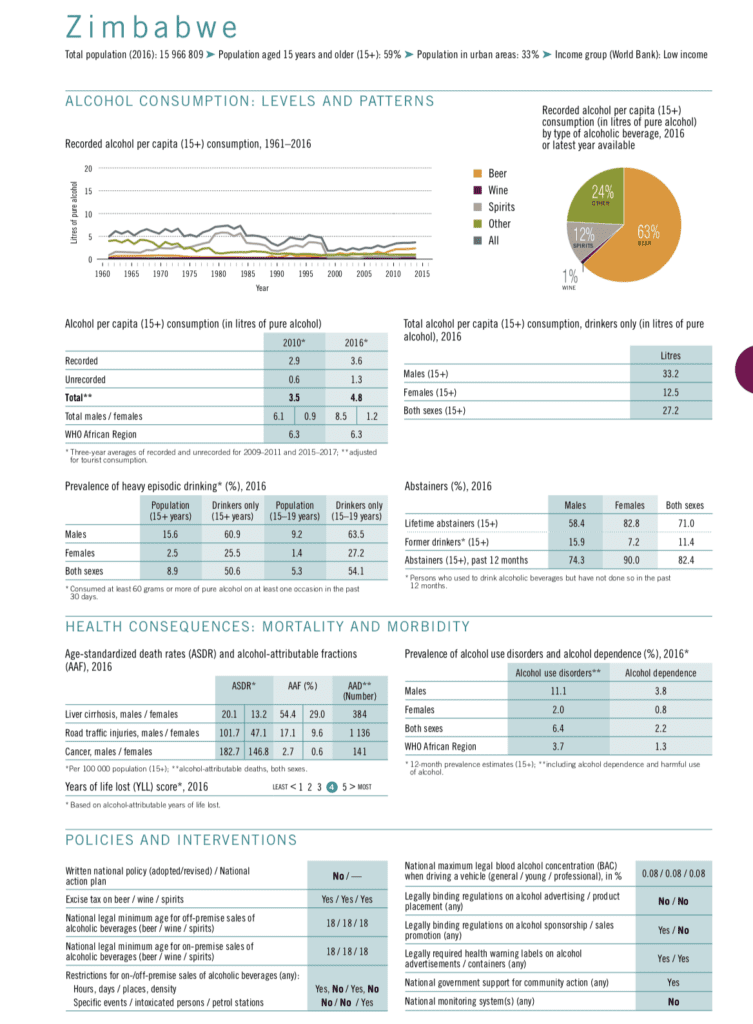Heavy alcohol use and binge alcohol use is creating the next public health crisis in Zimbabwe. Young people are at the highest risk.
A recent report titled “Mental Health Among Young People in the African Region” by the World Health Organisation (WHO) in Africa found Zimbabwe had one of the highest binge alcohol use rates among 15 to 19 year olds in the region. The rate is 70.7% for males and 55.5% for females.
The WHO defines heavy episodic alcohol use or binge alcohol use as having 60 grams or more alcohol in one occasion in the past 30 days.
An academic paper by Eliott Nkoma found that young Zimbabweans in their first year of university reported to having had alcohol from as young as 12 years of age.
Engaging in binge alcohol use is just as damaging as heavy alcohol use. Young Zimbabweans appear to be less aware of this fact.
Those who do not [have alcohol] the whole month, or the whole week, but binge [on alcohol] on the weekend or on pay day, also do harm to themselves,” said Dr. Florence Kamayonza, Regional Advisor for Mental Health and Substance Abuse of the World Health Organization (WHO) in Africa, as per The Sunday Mail.
Dr. Florence Kamayonza, Regional Advisor for Mental Health and Substance Abuse, World Health Organization
in Africa
COVID-19 worsens alcohol harm in Zimbabwe
The pandemic has worsened alcohol harm in Zimbabwe. As Movendi International reported previously, Delta, Zimbabwe’s Big Alcohol giant, recorded a 20% increase in beer sales for the nine months ending September 30, 2020 compared to the same time period in 2019. Sales increased by a massive 48% for the three months ending December 31, 2020 compared to the same time period in 2019.
SABMiller, now belonging to AB InBev, the world’s largest beer producer, owns Delta.
On-premise alcohol outlets such as pubs, bars, and beer halls were closed during this time period. This means people have been consuming much more alcohol, alone at home, while in lockdown.
The need for alcohol policy solutions
As the World Health Organization (WHO) reports, alcohol harm was already a problem and serious obstacle to development for Zimbabwe before the pandemic.
- The country is placed on the high end for years of life lost due to alcohol,
- More than 11% of men suffer from an alcohol use disorder, and
- While more than 80% of the adult population live free from alcohol, those who consume alcohol – mainly men – have an extremely high per capita alcohol intake (33 liters for Zimbabwean men).
Alcohol causes over 200 diseases including non-communicable diseases (NCDs) such as cancer, heart disease and liver disease. Latest evidence also shows relationships with alcohol use and communicable diseases such as tuberculosis and HIV/AIDS.
The WHO African region, including Zimbabwe, already suffers from a high communicable disease burden. And increasing alcohol use in young people can lead to a rise in NCDs and further aggravate the communicable disease burden in the region.
Despite the harm caused by the products and practices of the alcohol industry, Zimbabwe does not have a comprehensive alcohol policy.
Government applauded for alcohol policy effort to protect people during COVID-19
The Zimbabwean government has recently shown several promising policy improvements. One is the use of alcohol availability measures to reduce the spread of the coronavirus. The government took this measure to curb virus spread from people gathering to use alcohol and disregarding preventive measures.
Communities, including Movendi International member organization Youth Against Alcoholism and Drug Dependence (YADD), commended the government for prioritizing public health over alcohol industry profits during the ongoing health crisis.
This measure by the government aligns with scientific evidence which indicates the lethal interaction between alcohol and the COVID-19 pandemic and WHO advice to reduce alcohol use during lockdowns.
Furthermore, in April, 2021 the Zimbabwean government set in motion a National Drug Master Plan. The goal of the plan is to reduce the use of alcohol and other substances and resulting harm. The solutions in the plan include:
- Prevention education starting from primary school level, and
- Stronger enforcement of existing alcohol laws.
Blind spots in existing alcohol laws
Public health advocates have pointed out that there are blind spots in the existing Zimbabwean alcohol laws. YADD highlighted gaps in laws tackling alcohol marketing, alcohol availability and enforcement of age restrictions.
Young people are surrounded by aggressive advertising of alcohol. Alcohol is advertised as an aspirational lifestyle and its consumption promoted as normal and glamorous,” said Mr. Tungamirai Zimonte, founder of YADD and board member of Movendi Innternational, as per The Sunday Mail.
Alcohol is easily available and sold in our communities also very cheap, especially beer, no one asks for IDs at points of sale, there is lack of enforcement of existing laws.”
Mr. Tungamirai Zimonte, founder, YADD, and board member, Movendi International
The WHO recommends cost-effective Best Buy alcohol policy solutions with proven results to better prevent and reduce alcohol harm. The Best Buys include increasing alcohol taxes, banning alcohol marketing and reducing alcohol availability.
The WHO also provides the SAFER technical package with the five most cost-effective solutions countries can use to reduce harm caused by alcohol products.
Sources
The Sunday Mail: “A pandemic in bottled form . . .as excessive drinking becomes a concern“
263 chat: “Govt Applauded For Alcohol Restriction During Lockdown“
